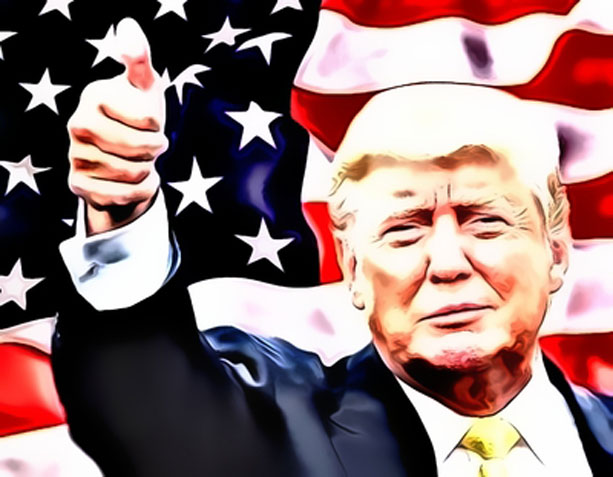
Republicans are going with an incumbent whose post-inaugural job approval until last weekend has never exceeded 46%, not coincidentally the exact same percentage of the popular vote he received.
Democrats overwhelmingly say their top issue is ousting Donald Trump over any conceivable policy proposals. But two dozen of their wannabe nominees have raced far from the electable center of the political spectrum to argue instead over a smorgasbord of trillion-dollar freebies.
The Republican who captured the Electoral College by slim virtue of some 70,000 votes in three key states has done virtually nothing to expand his appeal beyond the angry, frustrated folks who found his blunt talk refreshing.
The man who's been married three times has worked diligently and effectively to reinforce his loyal political base, primarily among evangelical Christians. And it's worked.
Instead of courting political media, or at least pretending to stroke their oversized sense of self-importance as most chief executives have done, Trump has relentlessly attacked them as enemies of the people for reporting contrary to his views and wishes.
While a majority of Americans tell pollsters they definitely will not vote to extend Trump's White House lease for a second term, a majority also say they believe he will be reelected.
How does that work? For that matter, how does any aspect of this unusual scenario fit into understanding U.S. politics in the summer of 2019?
Simple answer, it doesn't. But we'll try to sort at least some of it. For starters, sharp partisan splits come and go in American politics, mainly centered on elections designed to divide the country into Us and Them.
That's how parties mobilize ground troops and money and enforce discipline on voters. But this time, neither party is the least bit interested in attracting newcomers into their tent.
Former Vice President Joe Biden seems to get in trouble pretty easily. But did you see the trouble he ignited by recalling rather reasonably that he'd worked collegially with Senate Republicans in the past? That's how the people's business is supposed to get done — through trade-offs.
Biden was even the undercard on the 2008 Barack Obama ticket that vowed to end once and for all Washington's bitter partisan divide. That PR pledge, of course, was empty but had a perceived useful appeal just 11 years ago.
No more talk allowed in this cycle about reaching across any aisle, even to attract reasonable swing voters. You're with us. Or you're against us.
Polls 69 weeks out are of only passing interest. But the results in some key states indicate Trump is in trouble against some Democrats, mainly Biden. The president relishes presiding over turmoil. Americans not so much.
As probably the least woke candidate on the planet, Biden seems unlikely to survive the upcoming infighting of a party collectively so far out there from his nearly half-century of experience.
But if he did survive the primaries, Biden could make an effective general election candidate, the anti-Trump, squeaking through in November as an experienced political veteran vowing to serve one term and return a sane calm to the White House. And picking a woman as his running mate.
Trump says he's absolutely sticking with Mike Pence as his No. 2. Perhaps you've noticed, though, this president changes his mind, sometimes the same day.
The Democrats' convention comes first next summer. Trump will have a month to gauge the ticket that emerges from Milwaukee. What if in that time Pence claimed he was tired of attending foreign funerals?
A 74-year-old Trump would dominate news cycles for weeks with a suspenseful selection process that ended with a 48-year-old Nikki Haley as his ticket mate.
She has legislative experience, chief executive experience as a popular two-term governor of South Carolina. She's the daughter of Indian immigrants and wife of an Army captain with combat experience.
The savvy Haley and Trump worked well together when she was his UN ambassador and talked tough to Russia in the Security Council.
The crowd of Democratic candidates is seven larger than the unwieldy 2016 GOP field of 17 that chose the most unlikely candidate from the debate stage. The same 20 Democrats will appear in the next primary debates at month's end.
But tightened qualifications will squeeze some out for September's go-round. Party officials will be happy to narrow the field and convince a couple likely dropouts such as Beto O'Rourke and Steve Bullock to help retake the Senate next year.
Then there's the money problem. We'll know next week what each candidate raised in the second quarter. Even combined, however, the field won't equal the $105 million the Trump campaign and Republican National Committee reported.
Another way the 2020 election will surprise is that like 2016, money will not likely be the determining factor. As strangely simple as it sounds, the candidates will probably be deciding factors.
By election day in 2016, even the dimmest voter knew Trump was unorthodox and unlikely to win. This time, though, they've experienced his style almost daily. Will a strong economy and job market, if they stay strong, be sufficient to overcome any buyer's remorse?
In the last century, elected presidents seeking a second term have won 13 of 17 times, especially if they can make the election about their opponent, not their own record. The economy was key.
For the Democrats, several will experience media and poll surges in coming months and run with that momentum or fall flat. That's what primaries are for, to find the strongest nominee with smarts and, above all, stamina.
It seems impossible that party could again nominate as bad a candidate as Hillary Clinton. But then, it once seemed impossible that Clinton could find a way to lose to an adopted Republican so unlikely to win.
(COMMENT, BELOW.)
Andrew Malcolm
McClatchy Washington Bureau
(TNS)
Malcolm is an author and veteran national and foreign correspondent covering politics since the 1960s.


 Contact The Editor
Contact The Editor
 Articles By This Author
Articles By This Author